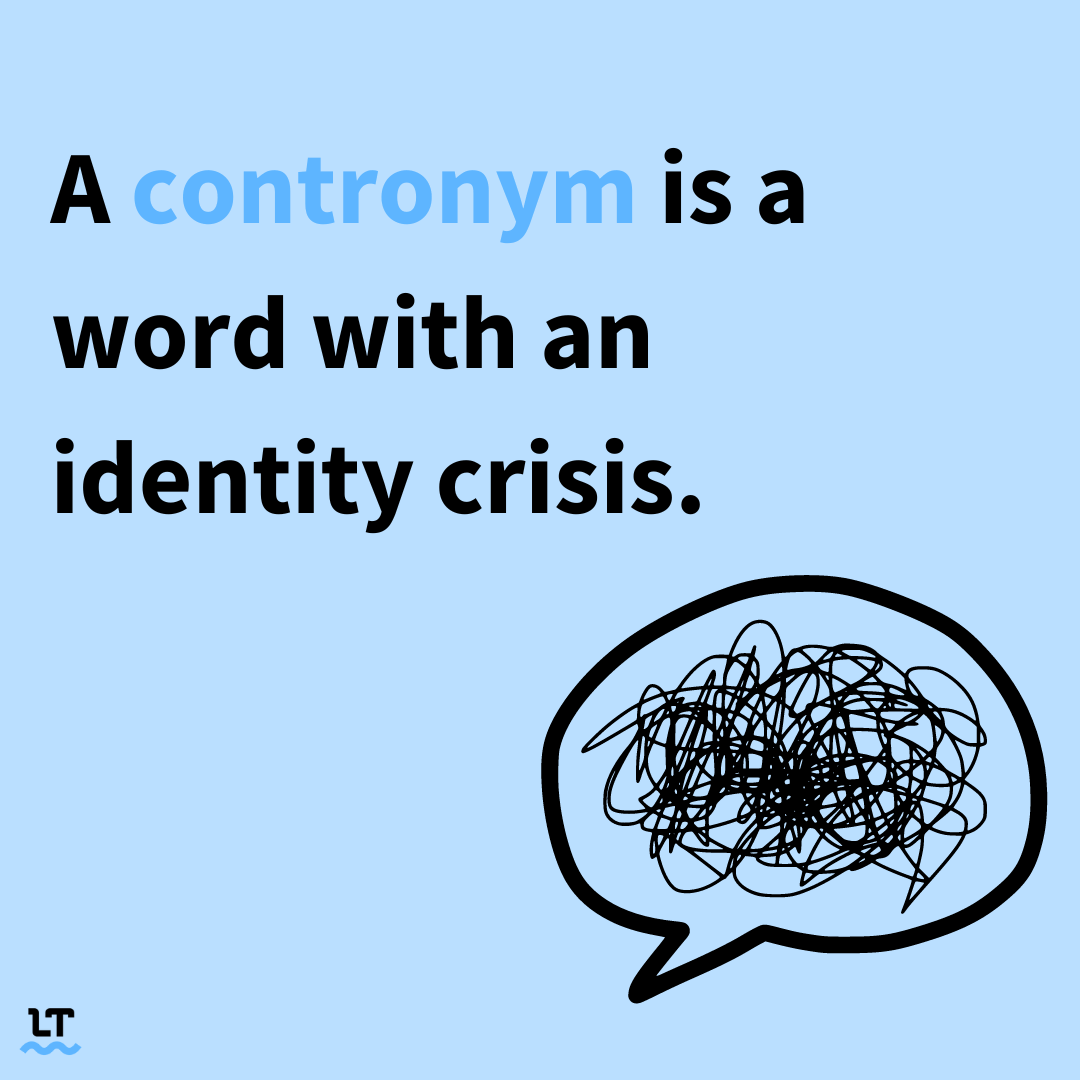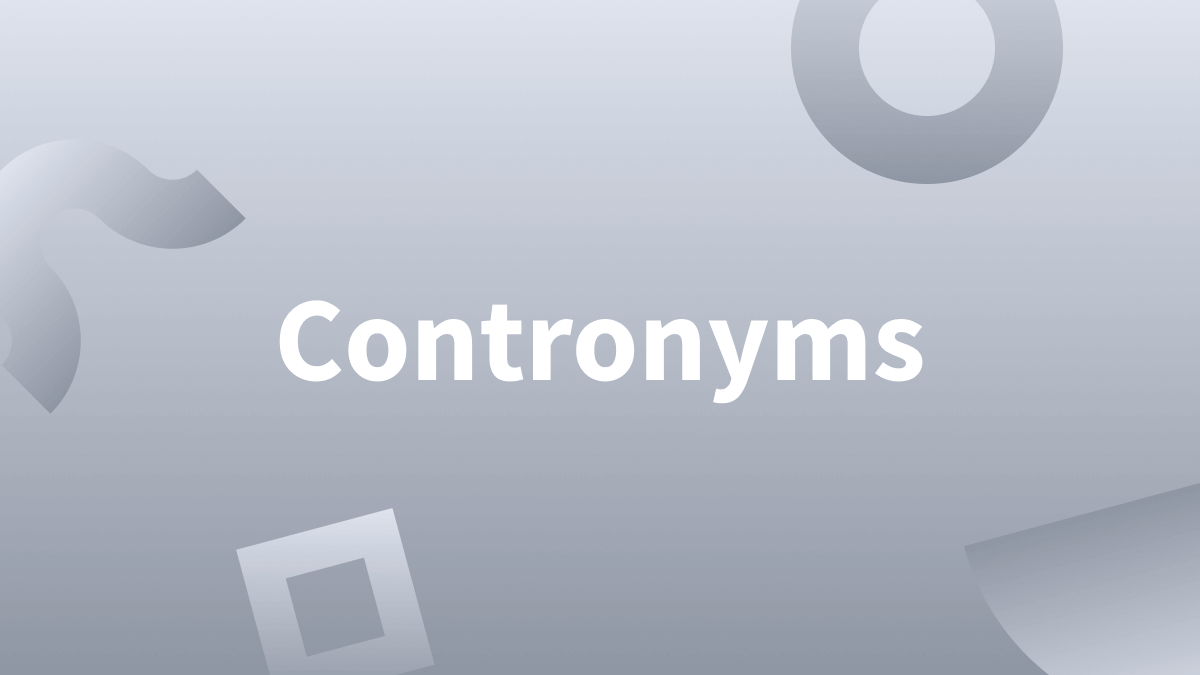Contronyms: Quick Summary
A contronym (or auto-antonym) is a word with contradictory meanings. For example, dust is a verb that means “to remove dust from a surface,” but it can also mean “to cover lightly with a powdered substance.”
- I asked Ian to dust the furniture before he left.
- I was taught to dust the counter with flour before rolling the dough.
Contranym is another acceptable spelling, but contronym is more widely used.
What Is a Contronym?
A contronym (also known as an auto-antonym, among other terms) is a word that has two meanings that are the opposite of each other. For example, the verb cleave can mean “to split or cut something,” but it can also mean “to stick closely to.”
The butcher used a sharp knife to cleave the meat into smaller pieces.
She wanted to cleave to her goals no matter what.
You may be wondering why contronyms exist in the first place, and we don’t blame you. They can be extremely confusing, whether you’re a native speaker or an English language learner.
There are a few reasons why contronyms exist. One is that a word may have a different etymology (or origin) than another word, but coincidentally, they happen to share the same form. Cleave is an example of this type of contronym.
Additionally, the English language is ever-evolving, and therefore, with time, some words acquire different and opposite definitions. Think of sanction, which can mean “to permit” or “to penalize.”
Another reason that contronyms exist is due to the differences in English dialects. For example, in American English, the verb table means “to postpone the consideration of,” whereas, in British English, it means “to present formally for discussion or consideration.”
Now that we know what contronyms are and why they exist, let’s get to the fun part! Below, you’ll find a list of seventeen kooky contronyms.

Contronym Examples
1. Bound
Bound can mean “going to a destination” or “being restrained from movement.”
He is bound for college.
The magician was bound by his wrists and ankles.
2. Buckle
Buckle can mean “to fasten or secure” or “to break or collapse.”
I made sure to properly buckle my daughter in her car seat.
The poor horse buckled from heat exhaustion.
3. Consult
Consult can mean “to seek advice or information from someone” or “to provide professional advice or service.”
She consulted her accountant before deciding.
We were hired to consult on the new project.
4. Fine
Fine can mean “of high quality” or “acceptable; okay.”
That’s a fine wine you picked out.
I know it’s not perfect. But it’s fine for now.
5. Hold Up
Hold up can mean “to support or sustain something” or “to delay or hinder something.”
We were going to hold up the sign so that everyone could see it.
There’s an accident that’s holding up all the traffic.
6. Lease
Lease can mean “to rent a property to someone” or “to rent a property from someone.”
She leased her apartment to her cousins while she traveled.
They leased their apartment from their cousin.
7. Left
Left can mean “leave” or “remain.”
They had left by the time I was back.
Only two seats are left.
8. Off
Off can mean “activated” or “deactivated.”
The alarm went off.
The cameras are off.
9. Overlook
Overlook can mean “fail to notice” or “to look over.”
She got fired for overlooking many costly errors.
She was hired to overlook the merger.
10. Peer
Peer can mean “a person of nobility” or “an equal.”
The queen’s peers in the House of Lords advised her on matters of the state.
The jury was made up of my peers.
11. Quite
Quite can mean “to a significant extent” or “to a minor extent.”
She was quite confident in her ability to win first place in the race.
It was quite chilly yesterday, but not uncomfortably so.
12. Screen
Screen can mean “to conceal” or “to present.”
The actress was screened from the paparazzi by her bodyguards.
The film was screened at a festival.
13. Throw out
Throw out can mean “to discard something” or “to offer something.”
I’m going to throw out these leftovers.
I’m going to throw out some ideas for you.
14. Wind up
Wind up can mean “to bring something to a conclusion or finish” or “to start something.”
Let’s wind up this meeting because it’s getting late.
You need to wind up the toy car, if not, it won’t work.
15. Weather
Weather can mean “to endure” or “to wear away.”
Let’s weather the storm together
The storm weathered away all our furniture.
Let’s Weather English Complexities Together
There are many more contronyms in English. The list above includes just a few that you may be using in your everyday language. These words may be confusing when you see their definitions side by side, but the context of a sentence will help you make out which sense of the word is being used.
Contronyms are just one of the many strange English complexities. There are also homophones, homographs, and homonyms; seemingly nonsensical idioms; words that are difficult to spell; and much, much more.
As an advanced, multilingual writing assistant, LanguageTool can help you learn the ins and outs of English. Give it a try—it’s free!

